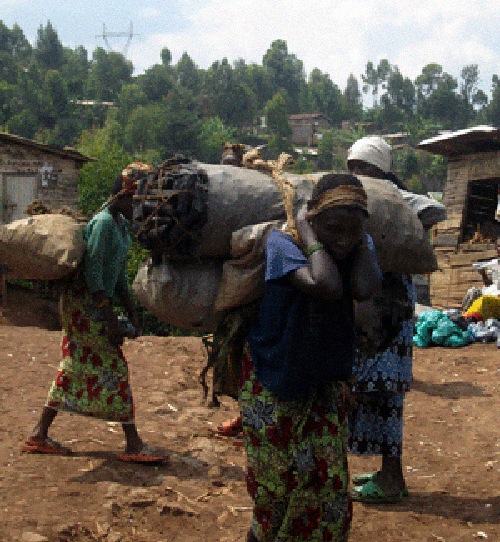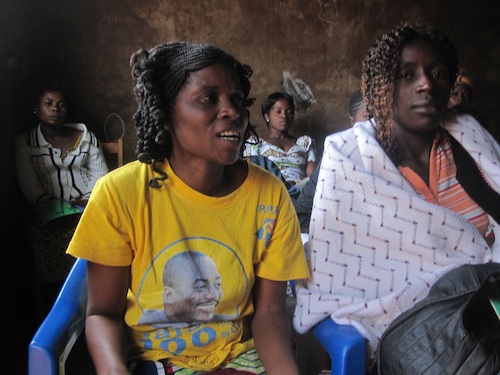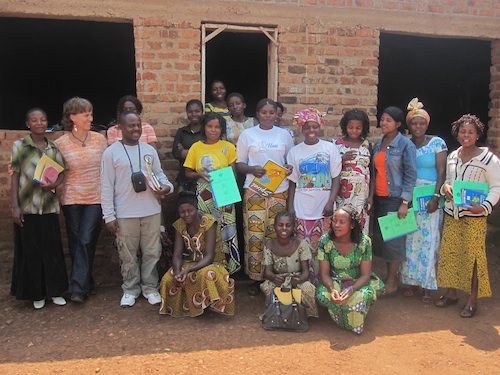
In Mumosho, like in Eastern Congo in general, women are more or less considered a production unit: they should give birth to many children (and absolutely not only girls), take care of the house and serve the husband, cultivate the land and work elsewhere to earn money. The most stunning image are all the women walking deeply bent along the roads with loads on their backs weighing up to 80 kilos. Beside men walk leisurely. And above all there is an alarming degree of sexual violence. You need a lot of strength and resilience to be a woman in Eastern Congo. And resilience is there. And strength. Meet the women of Mumosho.

I come to Mumosho to have a tapping training together with Amani Matabaro who is originally from there and has created an organization to support projects in his community. Specially for women and children. With us are also Cate Haight and Rebecca Snavely from the US who supports and funds Amani´s projects through their Action Kivu (www.actionkivu.org).
15 women are gathered in a small room of bricks that we have borrowed from one of the primary schools in Mumosho. Beautifully dressed as women always are in Congo. Ready to learn and and see if this tapping really can make a change.
I ask about the symptoms of trauma. One of the women, Françoise, a single mother of five children, says with an obvious experience:
“We know trauma very well here. Too well. Trauma is like a wound inside your heart. It hinders you from feeling fine or happy. When you are traumatized you get weak. A piece of land that used to take one day to cultivate will instead take over a month. You have headaches no matter what medicine you take. The heart beats so hard that it hurts. And sleeping is just something you dream about being able to do”
The other 15 women in the room nods acknowledging and start speaking very openly about the problems women live through. Mapendo, who also is a councellor for people living with hiv and Aids tells she was thrown out of her house by her in-laws because she had only given birth to four girls and no boy. She stands up and adds to what Francoise said:
“When you are traumatized people look at you they ask if you are sick, because you look sad and miserable. Young people look old.” She straightens the beautiful scarf she skillfully has arranged around the hair and gives us a smile.
Apart from being a deeply inequal society Eastern Congo has been the scene for violence and war since 15 years back when the genocide in Rwanda ended and spilled over the border to neighbouring Congo. The reasons for the conflict are many but a vital component for making it long lasting is the fact that the area is very rich in minerals – minerals needed in all electronic devices used in the world: specifically mobile phones and laptops (see enoughproject video). Mumosho is right on the border between the two countries and have been therefore been looted and attacked too many times. One armed group after the other coming and accusing the population for supporting the other groups. And therefore punishing them.
“You know, we so much need a technique like the tapping to help ourselves and others” says Esperance Mapendo who is a nurse and participated in a TTT training already some months ago (see “Peace Tappers in Mumosho” further down in the blog).
“Women have suffered a lot here and still do. In their marriages, in the community and from the violence of this ongoing armed conflict. Probably 80 percent of us are traumatized”.
All of the women get into the discussion about trauma. Very engaged. One after the other they continue giving more examples of how people get traumatized. We note them down on the blackboard:
-Women who have been raped get traumatized – not only from the rape itself but also for being pointed at by the others in the community. The shame feels so bad that she get traumatized again. They often isolate themselves.
– A woman who gives birth after being raped will also suffer also for that. And the child will be traumatized too since they are seen as children of the enemy.
– People living with hiv and aids are also marginalized and feel shame – just because they are sick and people have a lot of prejudices.And they also fear death and that their children will be orphans.
– Children who are orphans of war or aids are also traumatized. They see other children being taken care of – but they, they are alone.
-Many women are left by their husbands. Some men marry and then after producing a lot of children they leave and get another wife. But still they will ask the first woman for the money she earns to buy things for the new wife. No wonder getting traumatized while trying to care for all the children by oneself in that way. One feels like dying.
– If you don´t get pregnant fast enough after marriage your husband will leave you. Nobody will marry you again.
– When your husband dies, you and you children loses the right to the house and the land. That gives a trauma for survival.
-Families who have had their houses looted or burnt down by different armed groups don´t feel safe in their homes. And as soon as they see a soldier they get traumatized again.
Etc, etc, etc
Even Amani, being from the community gets amazed by the reality the women live in.
“We must start discussing these questions in the community so tht things can change!“ he says. Applaud from the women.
Then we list all the symptoms of trauma that the women have recognized in themselves and others in the community. When the list is already long one of the women says:
“I think this list is long enough, and do you know, some people have ALL these symptoms!: headaches, difficult to sleep, getting angry without reason, feeling isolated, lack of appetite, feeling weak… and even more. Imagine the lives we live!”
We start practicing TTT. First how to do it on themselves. Then they treat each other two by two. We regroup the plastic chairs to give some space to each couple. “Can we start?” asks Esperence. And they do. Silence falls over the little room. Only the sound of children repeating French sentences from the next classroom is heard. When finishing the tapping the silence remains. The 15 women sit relaxed, a bit leaned back. Beatrice, a widow with nine children, sits up with a smile, breaking the silence by saying:
“Wow, this technique is nice. I was like somewhere else during the tapping – like in paradise – feeling like flying”.
Everybody laughs and starts talking abut the experience of the tapping and how this could help the people in the community. We make a groups for discussing and then another list on the blackboard about how to reach out. A lot of suggestions appear.
Esperance, the nurse, makes a summary of the discussions:
“We like this treatment! It is easy. We will use it and we promise we will spread this to as many as possible. We will also approach the leaders of our community. It will make a change in our society like the way I have changed myself. I have practiced since the first time I had the training last time you were here. You know my husband left me with all my kids. He went to live with another woman. It was a heavy burden for me and it made me deeply traumatized. Every time we met in the village we would fight – with slaps and fists! People used to say that I was crazy like a mad woman.
But now after having used this treatment I can forgive my husband. I don´t fight with him anymore when we meet. I have realized that it is a normal problem, something that happens to many, not only to me. Now people say: “What has happened to her? She is so calm!”
She continues: “Yes, I have really changed. And I want others to experience the same thing.
We should have a special place where people could come and get treated and learn. Like a center. In that way we would reach many people and make it more formal and recognized. There we could also have discussions about gender related questions so that we can start changing the roles of men and women. “
Laughter and applauds. From the women and us.
Esperence´s comment confirms to me and Amani that we should do our best to create a Peace Trauma Tapping Center in Mumosho.
To do this we would need funding to compensate some of these women to do the trauma tapping and to pay rent for a house to be in. 50-100 SEK or 10 USD per month would take us a long way 🙂 Do You Want To Join us to make it real and in that way be part of making a difference in Eastern Congo?
Click our DONATE page…. anything is more than nothing!
ps. To know more about the confllict in DR Congo check Enough project’s (www.enoughproject.org) video: http://www.youtube.com/watch?v=aF-sJgcoY20&feature=player_embedded




